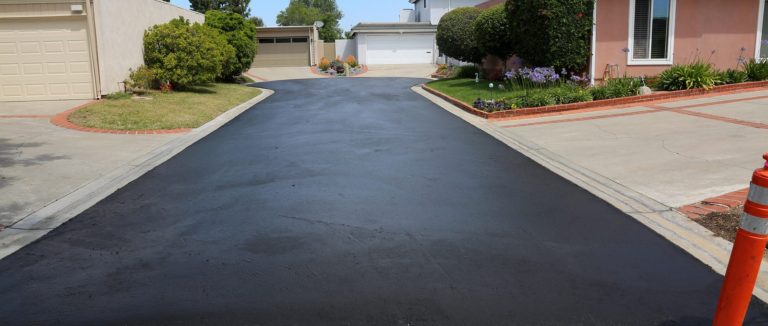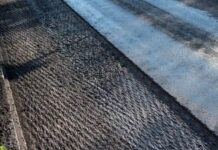How Often Should You Reseal Your Asphalt Driveway
Resealing your asphalt driveway is one of the most important steps in maintaining its durability, appearance, and functionality. A good asphalt driveway sealer can protect your driveway from harsh weather, heavy traffic, and general wear and tear. However, one of the most frequently asked questions is: How often should you reseal your asphalt driveway? This guide will provide insight into the optimal timing and practices for resealing your driveway, so you can ensure it stays in excellent condition for years to come.
At Commonwealth Paving, located at 136 Outerloop, Louisville, Kentucky 40214, we specialize in providing high-quality asphalt maintenance services, including expert advice and application of asphalt driveway sealer. If you have questions or need assistance with resealing your driveway, call us at +1 502 459 7283 for a consultation.
Why Resealing Your Asphalt Driveway Matters
Asphalt driveways are known for their durability, but they are still vulnerable to damage from UV rays, weather, and regular use. Over time, asphalt can start to deteriorate, leading to cracks, fading, and potholes. Resealing your driveway with a quality asphalt driveway sealer creates a protective layer that shields the surface from damaging elements, enhancing both its lifespan and aesthetic appeal.
Here are some of the key benefits of regularly applying an asphalt driveway sealer:
- Protection from UV Rays: The sun’s UV rays can cause asphalt to fade and become brittle, leading to cracks. A sealer helps prevent this by forming a protective barrier.
- Resistance to Water Damage: Sealing your driveway prevents water from seeping into cracks and eroding the base, which can cause potholes and other structural issues.
- Enhanced Appearance: Sealing rejuvenates the look of your driveway, giving it a fresh, dark finish that makes it look almost new.
- Oil and Chemical Resistance: Sealing protects the driveway from oil spills, gas, and other chemicals, which can weaken and degrade the asphalt.
Understanding how often to reseal is essential for maintaining these benefits without over-applying, which could lead to its own set of issues.
Factors That Influence Resealing Frequency
When determining how often to apply an asphalt driveway sealer, several factors come into play, including climate, traffic, and the age of your driveway. Here’s a look at each factor to help you assess your driveway’s specific needs.
1. Climate and Weather Conditions
Climate plays a major role in the wear and tear of an asphalt driveway. In areas with high UV exposure, like regions with hot, sunny summers, asphalt tends to deteriorate faster. Similarly, areas that experience harsh winters with freeze-thaw cycles are at a higher risk for cracks and potholes, as water can penetrate the surface and freeze, causing expansion and damage.
In Louisville, Kentucky, where Commonwealth Paving operates, the climate includes hot summers and cold winters, making regular resealing an essential part of driveway maintenance. Typically, driveways in areas with extreme temperatures should be resealed every 2 to 3 years to ensure they are protected from seasonal variations.
2. Traffic Volume
The amount of traffic your driveway handles also affects how often it needs resealing. Driveways with high traffic—whether from multiple vehicles, heavy equipment, or frequent turning and parking—are more susceptible to wear and tear. Frequent use can cause the sealer to wear down faster, so driveways with heavy traffic might require resealing every 1 to 2 years.
On the other hand, driveways with minimal traffic can go a bit longer between sealings. If you’re unsure about your driveway’s specific needs, Commonwealth Paving can evaluate the surface and recommend the optimal resealing schedule.

3. Age of the Driveway
Newly paved asphalt driveways should not be sealed right away. It’s essential to wait at least 6 to 12 months after installation before applying an asphalt driveway sealer, as the asphalt needs time to cure properly. After this initial sealing, a regular resealing schedule can be established based on traffic and climate conditions.
Older driveways that have shown signs of wear, such as small cracks or fading, may need to be resealed more frequently to maintain their integrity. In general, after the first reseal, most driveways benefit from a sealing every 2 to 3 years.
Signs Your Driveway Needs Resealing
Sometimes, visual cues indicate it’s time to apply an asphalt driveway sealer. Here are some signs that your driveway might be ready for resealing:
- Fading Color: When the driveway starts to look gray and faded, it’s often a sign that the sealer has worn off, leaving the surface unprotected.
- Cracks in the Surface: Small cracks can indicate the driveway is drying out and losing its flexibility. If left untreated, these can expand into larger cracks, leading to more significant damage.
- Water Pooling: If you notice water pooling on the surface rather than being repelled, it may be time to reapply the sealer.
- Surface Erosion or Roughness: Over time, you may notice the surface becoming rougher or showing signs of erosion. This is often due to the sealer wearing away, exposing the raw asphalt beneath.
When these signs appear, it’s best to address them promptly to prevent further damage. A timely resealing job by Commonwealth Paving can prevent minor issues from escalating into costly repairs.
How to Reseal Your Asphalt Driveway
While many homeowners attempt DIY resealing, hiring professionals like Commonwealth Paving ensures that the job is done correctly, using high-quality materials and equipment. Here’s an overview of the resealing process to give you an idea of what to expect.
Step 1: Surface Cleaning
A clean surface is essential for a successful resealing job. The driveway should be thoroughly cleaned to remove dirt, debris, oil, and grease. Pressure washing is often used to clear away any residues that could prevent the sealer from adhering to the asphalt.
Step 2: Crack Filling
Before applying the asphalt driveway sealer, any visible cracks should be filled to ensure a smooth surface. Crack fillers are used to prevent water from infiltrating the cracks and causing further damage.
Step 3: Applying the Sealer
Once the surface is prepped, the asphalt driveway sealer is applied in even layers. Professionals at Commonwealth Paving use specialized equipment to ensure that the sealer is distributed evenly, creating a uniform protective layer. It’s essential to follow the manufacturer’s instructions for drying time between coats, typically allowing 24 to 48 hours for the sealer to fully cure.
Step 4: Drying and Curing
After application, the sealer needs adequate time to dry and cure before the driveway can be used again. The time required depends on weather conditions, so it’s best to schedule resealing during dry, warm weather to speed up the curing process.
Seasonal Considerations for Resealing
The best time to apply asphalt driveway sealer is in late spring or early summer when the temperature is warm but not too hot. A temperature range between 50°F and 85°F is ideal, as it allows the sealer to dry evenly and adhere properly. Humidity levels also impact the curing process, so a dry, sunny day is generally best.
In Louisville, Kentucky, where Commonwealth Paving is located, summer is typically the prime season for resealing. Scheduling during this time ensures optimal conditions for a long-lasting application.
Benefits of Regular Resealing
Keeping up with a regular resealing schedule offers several long-term benefits, including:
- Increased Longevity: Regular application of asphalt driveway sealer can extend the life of your driveway, protecting it from the elements and minimizing the need for costly repairs.
- Enhanced Appearance: A freshly sealed driveway has a rich, dark color that significantly enhances curb appeal and gives a professional, well-maintained appearance.
- Cost Savings: By preventing cracks and erosion, resealing helps you avoid the expense of major repairs or premature replacement.
- Improved Safety: A sealed driveway provides a smooth, even surface, reducing the risk of tripping hazards caused by cracks and potholes.
At Commonwealth Paving, we prioritize quality and precision in every resealing job, ensuring that you get the most value out of your asphalt investment.
Common Mistakes to Avoid When Resealing
To achieve the best results with asphalt driveway sealer, it’s important to avoid common mistakes:
- Over-Sealing: Applying sealer too frequently can lead to peeling, flaking, and uneven texture. Stick to the recommended schedule, and avoid resealing more than once every year unless necessary.
- Ignoring Preparation: Failing to clean the surface thoroughly or skipping crack filling can result in a poor bond between the asphalt and sealer, reducing the lifespan of the application.
- Applying in Bad Weather: Sealing in extreme temperatures or during rain can cause the sealer to cure improperly, leading to an uneven finish.
- Using Low-Quality Sealers: High-quality sealers provide better protection and durability. Commonwealth Paving uses only premium asphalt driveway sealers for reliable results.
When to Contact Commonwealth Paving for Professional Assistance
While some homeowners may attempt DIY resealing, a professional application offers several advantages, including better quality materials, specialized equipment, and expert techniques. If you’re unsure about when to reseal, the condition of your driveway, or the best products to use, it’s wise to consult professionals.
At Commonwealth Paving, we provide expert asphalt driveway maintenance and sealer application, ensuring that your driveway remains in excellent condition year-round. We assess each driveway individually and recommend the best course of action based on its unique needs.
Final Thoughts on Resealing Your Asphalt Driveway
Regularly applying asphalt driveway sealer is a valuable investment that can protect and extend the life of your driveway. By understanding the factors that influence resealing frequency, you can keep your driveway in peak condition, enhancing its appearance, functionality, and safety.

If you have any questions about asphalt driveway sealer or need assistance with resealing, don’t hesitate to contact Commonwealth Paving at +1 502 459 7283. Our experienced team is here to provide guidance, answer your questions, and offer expert services for your asphalt driveway maintenance needs. Visit us at 136 Outerloop, Louisville, Kentucky 40214, and let us help you preserve the beauty and durability of your asphalt driveway for years to come.
Understanding Different Types of Asphalt Driveway Sealers. Which One Is Right for Your Needs?
Choosing the right sealer for your asphalt driveway is crucial to maintaining its longevity, appearance, and durability. An asphalt driveway sealer acts as a protective layer, shielding the surface from damage due to UV rays, water, chemicals, and wear from vehicles. However, not all sealers are the same, and understanding the different types can help you make an informed choice tailored to your needs.
Commonwealth Paving—located at 136 Outerloop, Louisville, Kentucky 40214—specializes in asphalt driveway maintenance and can assist you in selecting and applying the best sealer for your surface. For further inquiries or to schedule a consultation, feel free to reach us at +1 502 459 7283.
Why You Should Seal Your Asphalt Driveway
Asphalt driveways are a significant investment, providing a smooth, attractive, and durable surface for parking and driving. Over time, however, they can degrade due to environmental factors, such as sun exposure, temperature changes, and water infiltration. Here are some of the primary reasons for sealing an asphalt driveway:
- Protection from UV Damage: Sunlight can cause asphalt to oxidize, turning it brittle and leading to cracks.
- Moisture Resistance: Sealing helps prevent water from seeping into the asphalt and weakening the foundation, which could lead to cracks and potholes.
- Improved Durability: With the right sealer, an asphalt driveway is less likely to suffer from everyday wear, including chemical spills and general traffic.
- Enhanced Appearance: Sealers give the driveway a fresh, black finish, improving curb appeal and making it look well-maintained.
With regular maintenance and the proper sealer, an asphalt driveway can remain functional and attractive for years, saving you from costly repairs or replacements down the line.
Types of Asphalt Driveway Sealers
There are several types of asphalt driveway sealers, each offering unique properties that make them suitable for different applications. Here’s a comprehensive overview of the most common types, to help you understand their benefits, drawbacks, and ideal uses.
1. Coal Tar Sealers
Coal tar sealers are among the most popular options for asphalt driveway protection. Derived from coal, these sealers are highly durable and provide a strong protective barrier against water, chemicals, and UV damage.
Pros of Coal Tar Sealers:
- Excellent protection against chemicals, especially oil and gasoline spills.
- Highly durable, often lasting 3 to 5 years.
- Provides a dark, black finish that enhances the driveway’s appearance.
Cons of Coal Tar Sealers:
- Strong odor during application, which can be unpleasant.
- Contains volatile organic compounds (VOCs), which can have environmental and health impacts.
- Requires professional application to ensure safe handling.
Best For: Driveways that experience high traffic or are regularly exposed to chemicals and oil, as these sealers offer the highest level of protection.
2. Asphalt Emulsion Sealers
Asphalt emulsion sealers are a more environmentally friendly alternative to coal tar. Made from asphalt rather than coal, these sealers are typically lower in VOCs and offer good protection for residential driveways.
Pros of Asphalt Emulsion Sealers:
- Safer for the environment and lower in VOCs.
- Easier to apply than coal tar sealers.
- Provides a natural black finish, although it may not be as dark as coal tar.
Cons of Asphalt Emulsion Sealers:
- Less resistant to chemical spills, particularly oil and gasoline.
- Generally does not last as long as coal tar, with a lifespan of 2 to 3 years.
Best For: Homeowners seeking a safer and more eco-friendly sealer for standard residential asphalt driveways.
3. Acrylic Sealers
Acrylic sealers are a synthetic option that offers excellent durability, protection, and aesthetic appeal. They come in a variety of colors, allowing you to customize the look of your asphalt driveway, and they are highly resistant to fading from UV exposure.
Pros of Acrylic Sealers:
- Long-lasting, with a lifespan of up to 5 years.
- Resistant to UV rays, reducing the risk of fading.
- Available in different colors, allowing for customization.
Cons of Acrylic Sealers:
- Higher cost compared to coal tar or asphalt emulsion sealers.
- Requires precise application, often best done by professionals.
Best For: Driveways where aesthetics are a priority, or for homeowners looking for a long-lasting solution that resists UV damage.
4. Polyurethane Sealers
Polyurethane sealers are newer to the market and provide exceptional durability. These sealers offer excellent resistance to moisture, chemicals, and UV rays, making them one of the most robust options available.
Pros of Polyurethane Sealers:
- Highly resistant to chemicals, UV rays, and water.
- Long lifespan, typically lasting 4 to 6 years.
- Provides a durable and resilient surface.
Cons of Polyurethane Sealers:
- Among the most expensive options.
- Requires professional application due to the complexity of the materials.
Best For: High-traffic areas or driveways in extreme climates where longevity and robust protection are essential.
5. Fast-Dry Sealers
Fast-dry sealers are designed for those who need quick drying times, allowing you to use the driveway shortly after application. They are especially useful for driveways that need to be operational within a short timeframe, such as those at busy commercial properties or multifamily residences.

Pros of Fast-Dry Sealers:
- Quick drying time, often ready for use within hours.
- Effective protection for driveways with moderate usage.
Cons of Fast-Dry Sealers:
- May not be as durable as other sealers.
- Limited protection against heavy chemical spills and extreme weather.
Best For: Situations where quick access to the driveway is essential, though typically recommended for short-term or temporary protection.
Choosing the Right Sealer for Your Asphalt Driveway
When selecting an asphalt driveway sealer, it’s essential to consider your specific needs, climate conditions, traffic levels, and aesthetic preferences. Here are some factors to help you decide which sealer might be right for you.
1. Environmental Impact
If minimizing environmental impact is a priority, asphalt emulsion and acrylic sealers are typically better choices. Both options have lower VOCs than coal tar sealers and are less harmful to surrounding plant and animal life.
2. Level of Protection Needed
For driveways exposed to heavy traffic, oil spills, or harsh weather, a high-strength option like coal tar or polyurethane sealer provides superior protection. These sealers offer greater resistance to chemicals, making them ideal for commercial or high-use driveways.
3. Budget Considerations
Budget often influences sealer choice, as prices can vary significantly between types. Coal tar and asphalt emulsion sealers are more affordable, while acrylic and polyurethane options come at a higher price point due to their durability and added benefits.
4. Aesthetic Preferences
Acrylic sealers offer flexibility with color options, allowing you to customize the appearance of your driveway. This can be a great option for homeowners who want to match their driveway to their property’s style.
If you’re unsure which sealer is best for your asphalt driveway, Commonwealth Paving can provide expert guidance based on your specific requirements. Our team understands the intricacies of each type of sealer and can help you make a decision that suits both your budget and protection needs.
The Sealing Process: What to Expect
Whether you decide to apply an asphalt driveway sealer yourself or hire professionals, understanding the process can help ensure a successful application. Here’s a basic overview of the sealing process:
- Cleaning the Surface: Dirt, debris, and any oil stains need to be removed to ensure the sealer adheres properly. This step may involve power washing and applying special cleaning agents for stubborn stains.
- Repairing Cracks and Potholes: Any cracks or holes should be filled before sealing to create an even surface and prevent further damage.
- Applying the Sealer: The asphalt driveway sealer is applied in a thin, even layer. This can be done using a brush, roller, or spray equipment, depending on the type of sealer used.
- Curing Time: The sealer needs time to dry and cure. Depending on the type of sealer and weather conditions, this process can take anywhere from 24 to 48 hours.
Maintenance Tips to Extend the Life of Your Sealer
After applying an asphalt driveway sealer, there are several maintenance practices that can help prolong its effectiveness and keep your driveway in excellent condition:
- Regular Cleaning: Sweep or wash your driveway periodically to prevent debris from accumulating, which can cause abrasion and wear down the sealer.
- Avoiding Heavy Loads: If possible, avoid parking heavy vehicles or equipment on your driveway, as this can stress the surface and lead to cracks.
- Monitoring for Damage: Inspect your driveway periodically for signs of cracks, fading, or peeling in the sealer. Address any issues promptly to prevent further deterioration.
- Seasonal Sealing Checks: In climates with extreme weather, such as Louisville, Kentucky, resealing every 2 to 3 years is often recommended to maintain optimal protection.
Choosing the right sealer for your asphalt driveway is essential to protect your investment and keep it looking great. By considering the different types of sealers and their benefits, you can select an option that aligns with your needs, budget, and desired level of protection.
For guidance on selecting and applying an asphalt driveway sealer, Commonwealth Paving offers expert advice and professional services. Located at 136 Outerloop, Louisville, Kentucky 40214, we’re here to help you.
Address
Commonwealth Paving, 136 Outerloop, Louisville, Kentucky 40214
Phone: 502-459-7283, Fax: 502-456-2678
Opening Hours
| Monday | 9:00 AM – 5:00 PM |
| Tuesday | 9:00 AM – 5:00 PM |
| Wednesday | 9:00 AM – 5:00 PM |
| Thursday | 9:00 AM – 5:00 PM |
| Friday | 9:00 AM – 5:00 PM |
| Saturday | Closed |
| Sunday | Closed |






